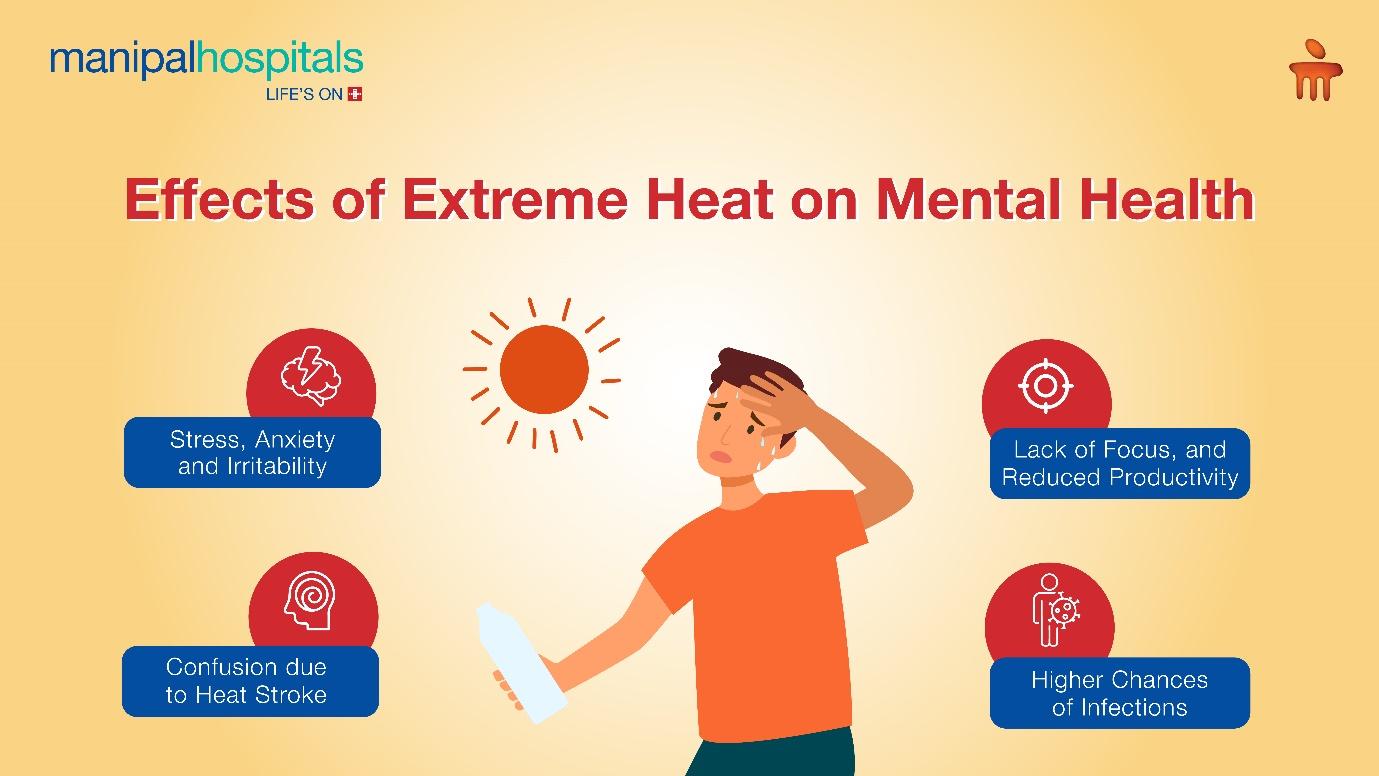
Listen to article
Loading audio...
Summers bring a reprieve from wintery colds and rejuvenating sunlight. However, they also usher in soaring temperatures that can wreak havoc on the human body. With recent summers growing hotter and longer due to climate change, rising temperatures now pose detrimental effects on both physical and mental health.
As the mercury rises each summer, our moods often shift for the worse. The current temperature spike beyond 40 degrees’ Celsius sparks increased frustration and irritation. Moreover, consistently high temperatures and heat waves elevate the risk of hospital admissions to severe dehydration or mental health concerns. Here are some ways extreme heat affects the brain and mental health.
Synopsis

Higher Temperature, Higher Stress
As the temperatures soar, our moods turn more sour. Feelings of irritation, frustration, and stress become common during periods of extreme heat. This is because increasing temperatures affect our brain chemistry by temporarily lowering the levels of serotonin - the neurotransmitter responsible for regulating happiness. Extreme heatwaves affect serotonin production and regulation, resulting in lower levels which increase anxiety, discomfort, and stress, and decrease positive emotions like happiness and joy.
The effects of heat waves are raised cortisol (primary stress hormone) levels in the body which intensifies feelings of stress. Moreover, rising temperatures reduce activity in the parasympathetic nervous system, which counteracts stress by inducing relaxation. With this anti-stress system switched off, we become even more susceptible to stress during heat waves.
For the younger population who have intense fears about climate change, worsening summer heat causes eco-anxiety which also contributes to the heightened stress levels.
Reduced Focus and Productivity
People are less productive on hotter days due to two reasons - lack of sleep and reduced oxygen levels in the brain.
Heat directly disrupts the normal sleep cycle, making it difficult to get sufficient restorative sleep. Insufficient sleep then impairs reaction times, focus, and cognition in both the short and long term. And lower blood oxygen saturation disrupts optimal brain function. Long-term exposure to high temperatures also impairs cognitive abilities like recall, concentration, and intellectual ability.
Confusion and Disorientation
Whatever throws the body’s physiological state off balance inevitably affects the brain. As temperatures rise, our bodies naturally respond by increasing sweat production to cool down. However, excessive sweating coupled with inadequate hydration can induce confusion and a sense of disorientation. The effects of heat waves on humans also raise internal body temperatures. If this elevated internal heat persists for extended periods, it leads to heat exhaustion - a precursor that can progress to heat stroke.
The fatigue and discomfort from dehydration or heat exhaustion directly impact mental capacities, leading to increased irritability and trouble concentrating. In more severe cases of heat stroke, there is more agitation, erratic behaviour changes, and even hallucinations as the brain's thermoregulatory system becomes overwhelmed.
Higher Chance of Infections
Droughts and extreme weather events release more pollutants and allergens into the air and reduce air quality. This decreased air quality triggers or exacerbates symptoms of mental illness in vulnerable individuals. A 2024 review reveals another concerning link - extreme heat increases the permeability of the blood-brain barrier. This barrier normally protects the brain from toxins and pollutants in the bloodstream. However, when compromised by excessive heat, the brain becomes more vulnerable to these harmful substances crossing over.
Ways to Tackle Heat
Implementing ways to tackle heat stress becomes important to reducing mental distress and cooling down the feelings of heat. Some strategies include:
- Drinking enough water and increasing electrolyte intake to prevent dehydration.
- Wearing lighter fabrics like cotton and linen in lighter hues.
- Walking in the shade, using umbrellas and covering the head to protect from the sun’s rays.
- Working in air-conditioned areas.
- Creating a cooling sleeping environment to sleep better.
- Opening the windows during the cooler times of the day.
- Taking frequent periods of rest.
- Regular Health check-up.
The extreme heat spares no one as it makes us all moody, and worsens our mental health. If these feelings progress to confusion, disorientation and impaired cognition, please consider visiting a healthcare professional. The Neurology Department at Manipal Hospitals, Vijayawada is adept in providing strategies and treatments to help heal the detrimental effects of extreme heat on the brain.
FAQ's
Extreme heat wave can reduce oxygen levels in the blood, impairing cognitive performance.
Heat waves increase stress, anxiety, discomfort, and irritability by lowering serotonin levels in the brain. Lack of sleep from heat disturbances can further worsen mood and mental health.
Failure to properly hydrate during heat can lead to confusion, disorientation, and heat exhaustion. Dehydration exacerbates heat's detrimental effects on cognitive and mental functioning.
Yes, older adults, young children, those with pre-existing mental illness, and outdoor workers are among the most heat-vulnerable populations.
Staying well-hydrated, getting enough sleep, limiting intense activity, accessing air conditioning, and being aware of heat's potential impacts can help safeguard brain health during extreme heat.



















 4 Min Read
4 Min Read

.png)












